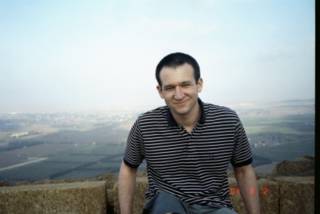A War Against the War against Prejudice
"The War Against Prejudice" is the title of a new radio documentary that played on BBC4 last week. It examines the Community Security Trust (CST), a British-Jewish defense organization which documents incidences of antisemitism and, through its volunteer services, provides security for Jewish events.The premise of the program - and it clearly has an agenda - is that the CST is a controversial organization that is hyping the antisemitism problem in Britain. It's a typically annoying project - the documentarian's main sources for criticizing the CST are two Jews, one of whom has long been a critic of the Jewish establishment, another an orthodox rabbi who has a history of downplaying conflicts between Muslims and Jews because of his position as the head of a large interfaith group. The documentarian's investigative work is apparently limited to outing the vandalizing of a synagogue as possibly the work of hoodlums rather than an overt act of antisemitism. He sounds like a idiot bringing this example to the CST and trying to use it to prove a systematic attempt by the CST to inflate the statistics.
There's nothing wrong with opposing views, of course, but do they really establish the CST as a controversial organization, or do they establish that the documentarian has created a controversy where none existed before, and hyped that controversy into a radio documentary? The Observer certainly doesn't think so, and referred to the CST's compilation of antisemitic attacks as "one of the most exhaustive analyses of abuse of Jewish people."
There is one chilling moment during an interview of Melanie Phillips, a columnist for the Daily Mail and the Jewish Chronicle, where Phillips, a demonstrated proponent of Jewish-Muslim interfaith relations, complains of being at a dinner and hearing a fellow diner say "I simply hate the Jews." To which Melanie replied, "What do mean you hate the Jews?" To which her fellow diner replied, "because of what they're doing to the Palestinians."
As Melanie told this to the interviewer, he says, "But she meant the Sharon government."
Did she? Is that for the interviewer to assume? And does this mean that we're simply supposed to let baldly antisemitic statements pass in the context of the Israeli-Palestinian conflict and assume they're aimed at the Sharon government. Melanie Phillips has written about the BBC documentary here.
Just imagine the equivalent scenarios:
"I hate the Christians."
"Why?"
"Because of what they're doing to the Iraqis."
"Because of what they're doing to the Kosovar Albanians."
"I hate the Muslims."
"Why?"
"Because of what they're doing to the Jews."
"Because of what they're doing to the Americans."
Would you consider these anti-Christian and anti-Muslim sentiments? I would. It's pretty certain that if someone expresses their hatred of Israel's government by saying they hate the Jews, there's something else there besides hatred of Israel's government, just as I'd say that anyone who presents their hate for the 9/11 terrorists as hate for Muslims should give others pause.
Remember when I wrote a few months ago that repeating the mantra that being anti-Israel was not antisemitic was fast becoming an excuse for people to utter antisemitic statements? I think it was when the Guardian published a letter by a prominent adherent of the theory that the Israelis were behind 9/11, claiming anti-imperialism and anti-racism as a defense that I realized the bounds of manipulating language were nearly limitless. And the other warning was when the anti-Israel-is-not-antisemitic mantra became the answer to a question no one was really asking. In situations where no one had made the claim that anti-Israel equalled antisemitic, someone would invariably invoke the mantra anyway.
Is it possible that the CST hypes the antisemitism problem slightly? Well, yeah. They fight antisemitism, and they fight a media and collection of prominent people who are underplaying the problem. Any defense organization worth its salt needs to remind people that a problem exists, and as any good lawyer knows, eyewitness accounts are not always going to be perfect. What is the CST supposed to do, underplay the problem and reassure people that nothing whatsoever is amiss? The Anti-Defamation League suffers from the same "problem". Does the ADL produce reports where the statistical methods are open to criticism? Sure. So does the RAND corporation. But no one calls them controversial.


1 Comments:
No one? I'll bet if things go the way they are going, someone will soon enough!: (
Post a Comment
<< Home